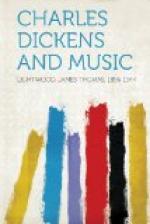One of Russell’s most popular songs. He sold the copyright for L3, and shortly afterwards learnt that the publisher had to keep thirty-nine presses at work on it night and day to meet the demand.
COPENHAGEN WALTZ (D. & S. 7)
Also known as the Danish Waltz.
DEAD MARCH.
From the oratorio Saul. Handel.
See p. 61.
DEATH OF NELSON (D.C. 52, D. & S. 48, O.M.F. iv. 3)
See p. 116.
J.
Braham.
Too well the gallant hero fought,
For England, home, and beauty.
DI PIACER (S.B.T. 1)
Rossini.
A favourite air from the opera La Gazza Ladra.
DOWNFALL OF PARIS
See p. 31.
DRAGON OF WANTLEY (D.C. 38)
An eighteenth-century popular burlesque opera.
Words by H. Carey, music by Lampe.
DRINK TO ME ONLY WITH THINE EYES (O.M.F. iii. 14)
Words by Ben Jonson.
The composer is unknown. The air was originally issued as a glee for three voices.
DUMBLEDUMDEARY (S.B.S. 10)
A refrain rarely found in old songs. It occurs in ’Richard of Taunton Dean.’ Also (as in the reference) the name of a dance.
EVENING BELLS (D.C. 38)
Duet by G. Alexander Lee.
Come away, come away, evening
bells are ringing,
Sweetly, sweetly; ’tis
the vesper hour.
FARE THEE WELL, AND IF FOR EVER (O.C.S. 58)
Words by Byron.
Included in ‘Domestic Pieces.’
Fare thee well, and if for
ever,
Still for ever,
fare thee well;
Even though unforgiving, never
’Gainst
thee shall my heart rebel.
About 1825 the words were set to an air from Mozart’s
La
Clemenza di Tito. There are original settings
by Parke,
S. Webbe, and six other composers.
FILL THE BUMPER FAIR (N.T.)
Moore’s Irish Melodies, air ‘Bob and Joan.’
FLOW ON, THOU SHINING RIVER (S.B.T. 1)
Moore’s National Melodies.
Said to be a ‘Portuguese Air.’ The melody has been utilized as a hymn-tune.




